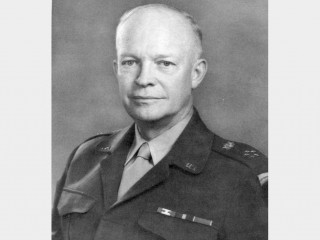
Dwight Eisenhower biography
Date of birth : 1890-10-14
Date of death : 1969-03-06
Birthplace : Denison, Texas, U.S.
Nationality : American
Category : Historian personalities
Last modified : 2010-05-07
Credited as : President of United States, Supreme Commander of the Allied forces in Europe, Pearl Harbor
Known as a great military leader and strategist, Dwight Eisenhower would later become one of the most regarded Presidents of the United States. His leadership in the Oval Office was not military-like, even when external pressures were at full force. He resisted communism from all angles and attempted to soothe the paranoia of a country worried about its infiltration. One of his most regarded characteristics and gifts was to bring people together to discuss their point of view in order that a compromise is reached.
Young Dwight was brought up as a pacifist to war by his German-American parents in Kansas. He and his other brothers were all called “Ike” by his parents. Dwight had the nickname “Little Ike”. Later on, his nickname would resurface when he ran for president. The slogan, “I like Ike” filled posters and garnished him more than a few votes. While growing up, his parents became Jehovah’s Witnesses. However, later, his father would leave the church and his mother would remain. No matter their differences, Eisenhower kept close ties with both his parents and eventually separated himself from any religious practices until he became a member of a Presbyterian church later in life. In any regard, Eisenhower’s parents were both educated and believed in an education for their son. However, when Dwight was admitted into West Point, no debate focused upon the possible quality of education he would receive.
As he climbed the ranks and served in various positions in military operations at home and abroad, Eisenhower’s well-organized and patient approach to life in general made him very popular to the American public. His nickname was Ike and he took with him in his presidency his open-minded approach to conservative politics – a rare mix indeed.
By the early 1940s, Dwight Eisenhower was working in Washington D.C., where he was eventually appointed to the Chief of Staff at Fort Ham in Houston, Texas. When Japan attacked Pearl Harbor, Eisenhower was involved in the plans that would eventually allow the United States to beat Japan and Germany. By 1950, Eisenhower’s rank and responsibility grew beyond what he would have ever imagined. He became commander of NATO forces in Europe and thereafter wrote an autobiographical memoir about his time there called Crusade in Europe. With his prestige in Europe, Dwight Eisenhower returned home to the United States as a revered hero of the nation. That’s when he decided to run for president. He would attempt to bring peace in conflicts abroad and help steady the economy at home. His presidency was one of peace and decent relations abroad. He was involved in fighting terrorism and communism abroad, but prevented war in both Asia and Latin America. In his last speech from the Oval Office, he encouraged Americans to get along with other nations, to work with a global scope, and to use our military power and prowess for security and peace. He did some, but what many cite was not enough in the fight for civil rights. However, the ideal, active, and much younger John F. Kennedy attempted to build upon these goals.
















